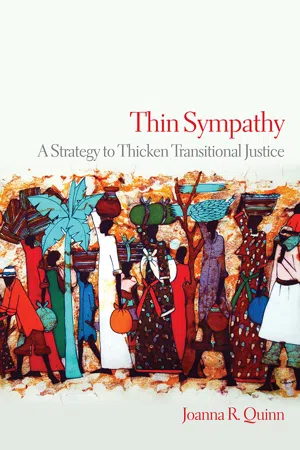
- 272 pages
- English
- ePUB (mobile friendly)
- Available on iOS & Android
About this book
Transitional justice, commonly defined as the process of confronting the legacies of past human rights abuses and atrocities, often does not produce the kinds of results that are imagined. In multiethnic, divided societies like Uganda, people who have not been directly affected by harm, atrocity, and abuse go about their daily lives without ever confronting what happened in the past. When victims and survivors raise their voices to ask for help, or when plans are announced to address that harm, it is this unaffected population that see such plans as pointless. They complain about what they perceive as the "needless" time and money that will be spent to fix something that they see as unimportant and, ultimately, block any restorative processes.Joanna R. Quinn spent twenty years working in Uganda and uses its particular case as a lens through which she examines the failure of deeply divided societies to acknowledge the past. She proposes that the needed remedy is the development of a very rudimentary understanding—what she calls "thin sympathy"—among individuals in each of the different factions and groups of the other's suffering prior to establishing any transitional justice process. Based on 440 extensive interviews with elites and other thought leaders in government, traditional institutions, faith groups, and NGOs, as well as with women and children throughout the country, Thin Sympathy argues that the acquisition of a basic understanding of what has taken place in the past will enable the development of a more durable transitional justice process.
Frequently asked questions
- Essential is ideal for learners and professionals who enjoy exploring a wide range of subjects. Access the Essential Library with 800,000+ trusted titles and best-sellers across business, personal growth, and the humanities. Includes unlimited reading time and Standard Read Aloud voice.
- Complete: Perfect for advanced learners and researchers needing full, unrestricted access. Unlock 1.4M+ books across hundreds of subjects, including academic and specialized titles. The Complete Plan also includes advanced features like Premium Read Aloud and Research Assistant.
Please note we cannot support devices running on iOS 13 and Android 7 or earlier. Learn more about using the app.
Information
Table of contents
- Cover
- Title Page
- Copyright
- Contents
- Preface
- Acknowledgments
- List of Abbreviations
- Chapter 1. Paving the Way: Making Transitional Justice Work Better
- Chapter 2. Background and History of Conflict in Uganda
- Chapter 3. Slow Decay or Intentional Neglect? Long-Term Issues with Post-Conflict Justice in Situations of Ongoing Violence and Repression
- Chapter 4. The Thin Sympathy Hypothesis and the Sympathetic Continuum
- Chapter 5. Switching On the Thin Sympathetic Response: Engaging the Population After Atrocity
- Chapter 6. Manufacturing Thin Sympathy
- Chapter 7. Thickening the Transitional Justice Strategy
- Chapter 8. Bridging the Divide: Applying Thin Sympathy in Other Divided Societies
- Chapter 9. The Strength of Thin Sympathy and Transitional Justice
- Appendix 1. Ethnocultural Group Representation in Ugandan Population
- Appendix 2. List of Political Conflicts in Uganda Since Independence
- Notes
- Bibliography
- Index